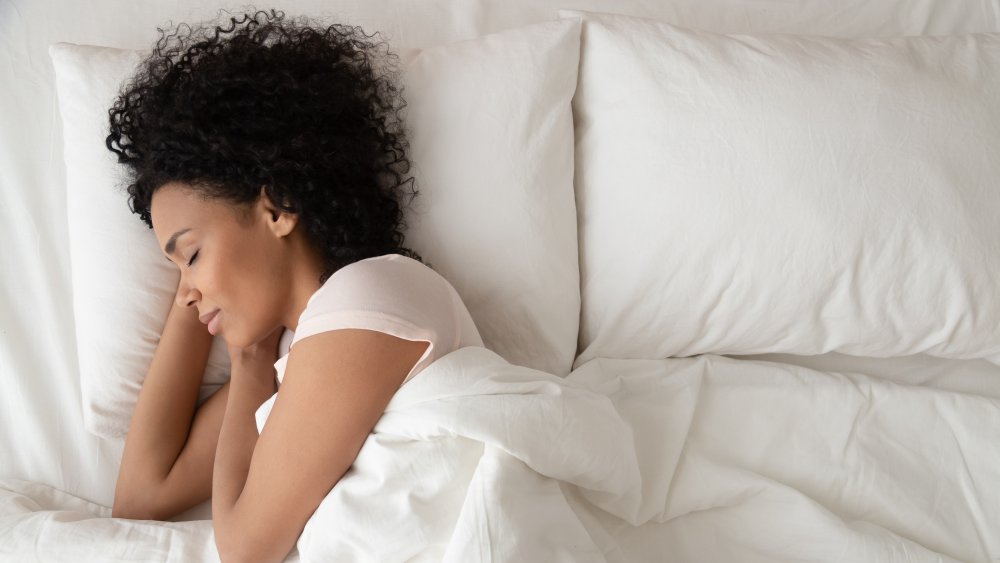Is Taking Melatonin Every Night Actually Safe?
Melatonin supplements are a synthetic form of a hormone in your brain that helps you sleep. Your brain increases melatonin production at nighttime, and decreases it during the day, working in sync with your circadian rhythm. The Mayo Clinic states that taking a melatonin supplement for a short period of time is safe. Taking a melatonin supplement can help if you're jet-lagged, for example, or struggling with certain sleep disorders, such as circadian sleep rhythm disorder, delayed sleep phase, and insomnia. Should you take it every night, though?
Some common side effects of taking a melatonin supplement include headache, dizziness, nausea, and drowsiness. If you have an autoimmune disease, you shouldn't take it at all. Less common side effects include mild anxiety, mild tremor, irritability, reduced alertness, short-lasting feelings of depression, abdominal cramps, disorientation, confusion, and hypotension.
Do not take melatonin if you are pregnant, breastfeeding, depressed, or have a seizure disorder, or an autoimmune disorder (via Hopkins Medicine). There are also some concerns with diabetes and high blood pressure. Consult your doctor before taking a melatonin supplement. You could have a drug interaction if you take certain medications, and it's a good idea to talk to your healthcare provider before starting any new supplement.
Should you take melatonin every night?
Hopkins Medicine notes that most people can take 1 to 3 milligrams of melatonin per night on a short-term basis — no more than a week or two at most. A melatonin supplement can help with jet lag or if you have to reset your sleep-wake cycle to get up earlier for school or work. Good sleep health is essential, and with melatonin, you can get a good night of rest.
According to Poison Control, though, there is not enough research done on the health effects of taking melatonin on a long-term basis. Still, it appears to be safe to take the supplement on a short-term basis, up to two weeks. Unlike sleep medications, you are less likely to become dependent, less likely to have a hangover effect, and you won't build up a tolerance to it requiring you to take more in the future.
Studies on taking melatonin
According to the American Academy of Sleep Medicine, delayed sleep-wake phase disorder is a circadian rhythm disorder where sleep and wake are delayed by a couple of hours. A 2018 study published in PLoS Medicine showed that melatonin combined with behavioral sleep-wake scheduling improved sleep-related impairments and disturbances with delayed sleep-wake phase disorder, and a 2011 study published in the Journal of Physiology-Paris found that melatonin can help reset the circadian rhythm.
Unfortunately, there isn't enough good research completed on whether it's safe to take a melatonin supplement every night for an extended time. Since it's classified as a dietary supplement, the FDA does not closely regulate it. Consult your primary care physician or sleep specialist about the use of melatonin for sleep. If you use it on a short-term basis and are still having trouble after a week or two, or it's not helping at all, stop taking it and talk to your doctor.
A melatonin supplement isn't a magic pill. You also have to practice good sleep habits to get a good night's sleep and wake up feeling well-rested.
Create a quality sleep routine
These sleep tips from The Sleep Foundation, the American Academy of Sleep Medicine, and HelpGuide will help you create good sleep habits. This can help considerably when combined with the short-term use of a melatonin supplement, and can help you set up good habits to help keep your quality of sleep high even after you stop taking it.
Keep it dark at bedtime to help your natural melatonin production. Use blackout curtains to block any light coming in, or use a sleep mask to keep light out.
Keep your bedroom temperature at about 65 degrees Fahrenheit. You won't sleep well if it's too hot or cold.
Be consistent. Wake up at the same time every morning. Set an alarm and get out of bed, even on weekends and holidays. Most adults need seven to nine hours of sleep each night, so work back from your wake up time to determine your bedtime (via Healthline).
Wind down to prepare your mind and body for sleep. Dim the lights and choose a soothing activity such as meditation, reading, or stretching. Turn off all devices 30 minutes to two hours before bedtime.
Avoid hitting the snooze button. Get out of bed and open the curtains to let some natural light in. This will help reduce your melatonin production and signal your brain that it's time to wake up.
Be mindful of your caffeine, alcohol, tobacco, and food intake. Avoid any of these later in the day as they can affect sleep.
Practicing these sleep habits, along with taking a melatonin supplement for a couple of weeks, should get you sleeping well again. If not, see your doctor as you could have a sleep disorder or other health problems.




